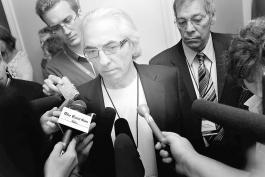By John Millikin
Telegraph-Journal
November 5, 2008
http://telegraphjournal.canadaeast.com/opinion/article/471097
Recently, critics have tried to denigrate the Assembly of First Nations and Phil Fontaine's leading role in the residential schools reconciliation commission. It is an unfair and ill-informed attack.
Susan Martinuk has written that Phil Fontaine is "determined to frustrate the process of healing for residential school survivors and keep at bay reconciliation with non-aboriginal Canadians and our government...." Martinuk suggests that Phil Fontaine was trying to railroad the reconciliation process by turning it into a survivor storytelling event with no reconciliation.
 |
| Phil Fontaine of the Assembly of First Nations speaks to the media just before a meeting of the Council of the Federation, involving all Canada’s premiers and territorial leaders. Fontaine and the AFN have come under fire for their role in the residential schools reconciliation commission. |
The reality is that without the stories of residential school survivors, there can be no reconciliation. To merely have a confession of the history of residential schools followed by a speedy reconciliation agreement would do nothing for real long-term relations between aboriginal and non-aboriginal Canadians.
Without complete disclosure of the scandal concerning residential school atrocities, non-aboriginal Canadians can have no understanding of the struggle that First Nations people continue to deal with on a daily basis.
When white South Africans heard the horror stories told by the victims of Apartheid to the South African Truth and Reconciliation Commission, only then did they understand what their government had done. The result of that truth commission has been a new awareness of and openness towards blacks. A remarkable and positive change in the thought process of South Africans has occurred.
Phil Fontaine understands first-hand that, like the blacks in South Africa, there is a deep need for the former residential school victims to have their stories told.
Non-aboriginal Canadians are often quick to judge the problems of the First Nations, attributing everything to substance abuse and government pampering.
We tend to ignore the roots of the problem and only see the surface. The root of the problem is abuse.
Generations of physical, sexual and psychological abuse took place in the residential schools run by church and state. This is the history that Phil Fontaine is rightly trying to ensure is heard.
Our lack of knowledge about the residential schools history results in frustration on both sides, with First Nations feeling mistreated and the rest of Canada feeling overtaxed to pay for issues with which they had nothing to do.Canadians are not by nature racists. We embrace multiculturalism and have a strong sense of social morality. But we also respect a strong work ethic and consider welfare to be a last resort.
These characteristics, when added to the federal government's failure to properly educate its citizens about residential schools history, has mistakenly led many of us to view the First Nations as a welfare case; a troubled race that is a constant financial drain on our government. This view needs to be corrected, and only with the telling of the stories of abuse will it be possible for that to happen.
Naturally, horrors of the past are extremely difficult for some people to face. Many Canadians, including some aboriginals, want the reconciliation process to happen quickly and disappear forever. Unfortunately, abuse is not easily swept under the rug.
Fontaine understands the psychological necessity for the stories of the abused parties to be heard. He believes that only then will Canadians comprehend the impact of the residential schools.
Imagine one of your children being removed from your arms, placed into a government car and driven away, not knowing when, or even if, they will be returned. When they do return months or years later, they aren't the children you once knew. They're troubled, angry, confused and resentful of you as a parent. Your child has been horribly abused and is no longer psychologically stable.
If you can truly look beyond race and skin colour and imagine these experiences as your own, then you are imagining the aboriginal residential school experience in Canada. That is what this reconciliation process is trying to deal with. Residential school survivors suffer heavy psychological trauma which can't be overcome with an apology and money.
The legacy of residential schools continues to ruin the lives of those who attended. It is not as simple as saying "get over it." An entire generation grew up in a culture of abuse, learning little else. Their school experience left them with few of the tools necessary to lead productive, fulfilling lives, leaving them dismayed as to how to raise healthy families of their own. They know abuse, and so abuse is passed on.
Given the magnitude of the residential schools church and state scandal, Phil Fontaine refuses to let the problem be swept under the rug. He wants the pain of aboriginals to be heard.
As Grand Chief, Phil Fontaine has a proven record of leadership and has shown himself to be a great negotiator for the AFN and for aboriginal Canadians.
Contrary to recent criticism, he seems to understand the reconciliation issue better than anyone and desperately wants to do it right so that all Canadians will finally be able to move forward.
Give the residential schools victims a chance to be heard. It is the democratic and Canadian thing to do.
John Millikin is a graduate of Trinity College Dublin, where he wrote his thesis on Canada's Residential Schools. He is currently studying Conflict Resolution.
Any original material on these pages is copyright © BishopAccountability.org 2004. Reproduce freely with attribution.